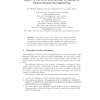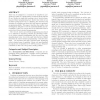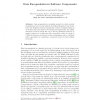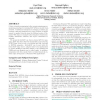ECOOPW
2004
Springer
15 years 7 months ago
2004
Springer
This paper reports on the results of the Fifth International Workshop on Object-Oriented Reengineering in Oslo on June 15, 2004. It enumerates the presentations made, classifies t...
104
click to vote
ECOOP
2004
Springer
15 years 7 months ago
2004
Springer
Given the importance of encapsulation to object-oriented programming, it is surprising to note that mainstream object-oriented languages offer only limited and fixed ways of enca...
OOPSLA
2005
Springer
15 years 7 months ago
2005
Springer
Roles can be assigned to occurrences of variables in programs according to a small number of stereotypical patterns of use. Studies on explicitly teaching roles to novices learnin...
SIGCSE
2005
ACM
15 years 7 months ago
2005
ACM
Java is the canonical language for teaching introductory programming, but its complex syntax and abundance of constructs are difficult for beginners to learn. This paper shows how...
ITICSE
2005
ACM
15 years 7 months ago
2005
ACM
There are an increasing number of books published on the important topics of “object-oriented programming” and “object-oriented design” for use in education. However, obje...
ITICSE
2005
ACM
15 years 7 months ago
2005
ACM
Problems with understanding concepts, so called misconceptions, have been investigated and reported in a number of studies regarding object-oriented programming [4], [3]. In a fi...
101
click to vote
ITICSE
2005
ACM
15 years 7 months ago
2005
ACM
“Objects-first” is an increasingly popular strategy for teaching object-oriented programming by introducing the concepts of objects, classes, and instances before procedural e...
113
click to vote
CBSE
2007
Springer
15 years 8 months ago
2007
Springer
Data encapsulation is a familiar property in object-oriented programming. It is not only useful for modelling things in the real world, but it also facilitates reuse by enabling th...
129
click to vote
WWW
2007
ACM
16 years 2 months ago
2007
ACM
Object-oriented programming is the current mainstream programming paradigm but existing RDF APIs are mostly tripleoriented. Traditional techniques for bridging a similar gap betwe...




